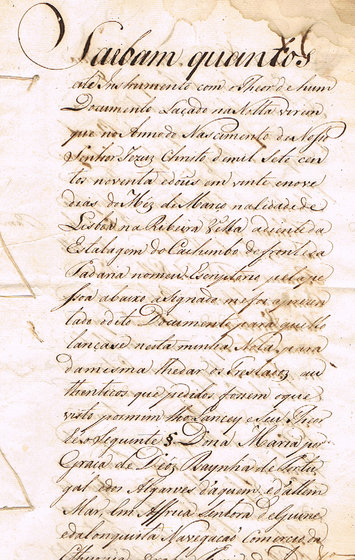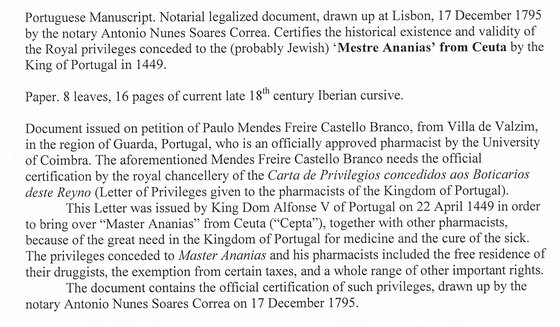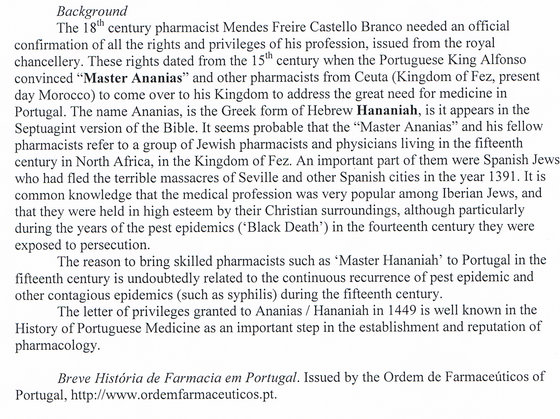DEMANDE DE FAIRE VENIR LE MÉDECIN (JUIF) DE CEUTA ANANIAS ET SES PHARMACIENS EN RAISON DU GRAND BESOIN DE GUÉRISON DES MALADES DANS LE ROYAUME DU PORTUGAL.
Master Ananias (Hananiah)
| Numéro d'objet: |
7671 |
| Date: |
1795 |
| Genre: |
Livre Manuscrit |
| Lieu: |
Lisbonne |
| Sujet: |
Médecine / Santé |
Recherche dans "Notes":
Portuguese Manuscript. Notarial legalized document, drawn up at Lisbon, 17 December 1795 by the notary Antonio Nunes Soares Correa. Certifies the historical existence and validity of the Royal privileges conceded to the (probably Jewish) ‘Mestre Ananias' from Ceuta by the King of Portugal in 1449.
Paper. 8 leaves, 16 pages of current late 18th century Iberian cursive.
Document issued on petition of Paulo Mendes Freire Castello Branco, from Villa de Valzim, in the region of Guarda, Portugal, who is an officially approved pharmacist by the University of Coimbra. The aforementioned Mendes Freire Castello Branco needs the official certification by the royal chancellery of the Carta de Privilegios concedidos aos Boticarios deste Reyno (Letter of Privileges given to the pharmacists of the Kingdom of Portugal).
This Letter was issued by King Dom Alfonse V of Portugal on 22 April 1449 in order to bring over “Master Ananias” from Ceuta (“Cepta”), together with other pharmacists, because of the great need in the Kingdom of Portugal for medicine and the cure of the sick. The privileges conceded to Master Ananias and his pharmacists included the free residence of their druggists, the exemption from certain taxes, and a whole range of other important rights.
The document contains the official certification of such privileges, drawn up by the notary Antonio Nunes Soares Correa on 17 December 1795.
Background
The 18th century pharmacist Mendes Freire Castello Branco needed an official confirmation of all the rights and privileges of his profession, issued from the royal chancellery. These rights dated from the 15th century when the Portuguese King Alfonso convinced “Master Ananias” and other pharmacists from Ceuta (Kingdom of Fez, present day Morocco) to come over to his Kingdom to address the great need for medicine in Portugal. The name Ananias, is the Greek form of Hebrew Hananiah, is it appears in the Septuagint version of the Bible. It seems probable that the “Master Ananias” and his fellow pharmacists refer to a group of Jewish pharmacists and physicians living in the fifteenth century in North Africa, in the Kingdom of Fez. An important part of them were Spanish Jews who had fled the terrible massacres of Seville and other Spanish cities in the year 1391. It is common knowledge that the medical profession was very popular among Iberian Jews, and that they were held in high esteem by their Christian surroundings, although particularly during the years of the pest epidemics (‘Black Death') in the fourteenth century they were exposed to persecution.
The reason to bring skilled pharmacists such as ‘Master Hananiah' to Portugal in the fifteenth century is undoubtedly related to the continuous recurrence of pest epidemic and other contagious epidemics (such as syphilis) during the fifteenth century.
The letter of privileges granted to Ananias / Hananiah in 1449 is well known in the History of Portuguese Medicine as an important step in the establishment and reputation of pharmacology.
Breve História de Farmacia em Portugal. Issued by the Ordem de Farmaceúticos of Portugal, http://www.ordemfarmaceuticos.pt.
Document délivré sur demande de Paulo Mendes Freire Castello Branco, de Villa de Valzim, dans la région de Guarda, au Portugal, qui est un pharmacien officiellement agréé par l'Université de Coimbra. Ledit Mendes Freire Castello Branco a besoin de la certification officielle par la chancellerie royale de la Carta de Privilegios concedidos aos Boticarios deste Reyno (Lettre de privilèges accordée aux pharmaciens du Royaume du Portugal).
Cette lettre a été émise par le roi Dom Alfonse V du Portugal le 22 avril 1449 afin de faire venir le "Maître Ananias" de Ceuta ("Cepta"), ainsi que d'autres pharmaciens, en raison du grand besoin de médicaments et de guérison des malades dans le Royaume du Portugal. Les privilèges concédés à Maître Ananias et à ses pharmaciens comprenaient la libre résidence de leurs pharmaciens, l'exemption de certains impôts, et toute une série d'autres droits importants.
Le document contient la certification officielle de ces privilèges, établie par le notaire Antonio Nunes Soares Correa le 17 décembre 1795.





